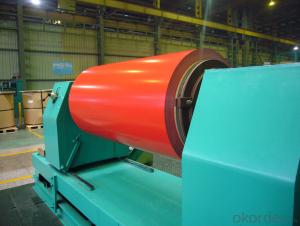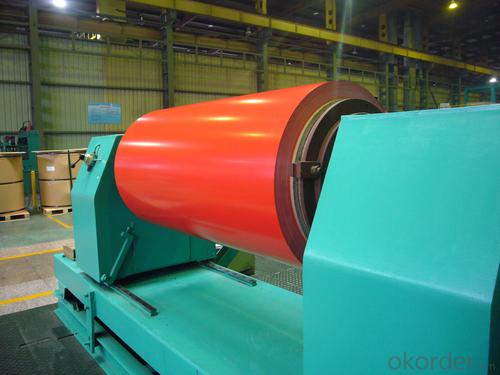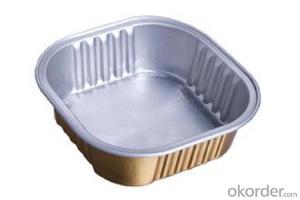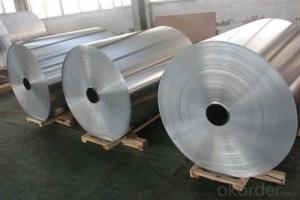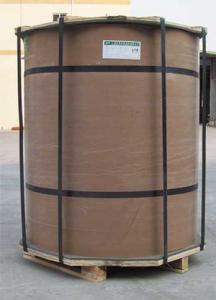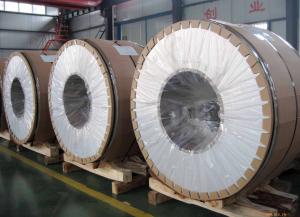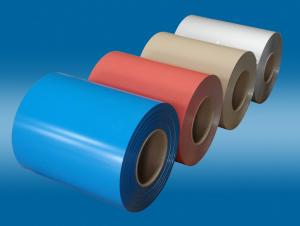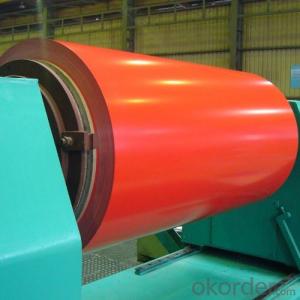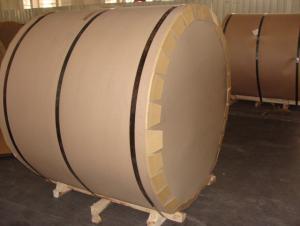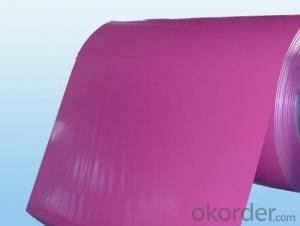PE Coated Gutter Aluminum Coil-3XXX
- Loading Port:
- China Main Port
- Payment Terms:
- TT OR LC
- Min Order Qty:
- -
- Supply Capability:
- -
OKorder Service Pledge
OKorder Financial Service
You Might Also Like
Product Description:
1 Specifications of PE Coated Aluminum Coil/Sheet
Alloy | AA1050,AA1060, AA1070, AA1100, AA3003, AA3004, AA3005, AA3105, AA5005, AA5052, AA5754, AA5083, AA8011 |
Temper: | H12, H14, H16, H18, H22, H24, H26, H32,HO, F |
Thickness: | 0.10-4.0mm |
Width: | 10mm- 2000mm |
Coating | PE(Polyester) |
Painting Thickness | Standard 16-25 microns, max 40 microns |
Color | Acording to Ral colors or customer’s samples |
Standard: | GB/T17748-1999, ASTM, ISO, EU standard |
Special Specification is available on customer’s requirement | |
PE(polyester) Coating
PE(polyester) coating:high molecular polymer as monomer and addition of alkyd, is an UV-resistant coating. It can be classified matt and glossy according to coating gloss. The compact molecule structure, makes paint surface luster and smooth,which assure good printing on the panel surface. With an warranty of 8-10 years for weather resistance, it is specially applied for internal decoration and sign board.
2 Usage/Applications of PE Coated Aluminum Coil/Sheet
Our company's PE Coated Aluminum Coil/Sheet have been widely used in the fields of construction and decoration(garage doors, ceiling etc.), electronic appliances, lighting decoration, air-condition air pipe, sanwich panels and drainage, etc.
- Q: How are aluminum coils joined together to form larger panels?
- Coil joining or coil-to-panel joining is the technique employed to combine aluminum coils into larger panels. To accomplish this, aluminum coils are fed into a coil joining machine, specifically designed for seamless connection of multiple coils. To initiate the process, the individual coils are inserted into the machine. The machine then unwinds the coils and brings them together, aligning them side by side. Typically, the edges of the coils slightly overlap to ensure a secure and uninterrupted connection. Once aligned, the machine implements various methods to bond the coils together. One prevalent approach involves the application of heat and pressure. By heating the overlapping edges of the coils, the aluminum softens and fuses together. Simultaneously, pressure is applied to ensure a robust bond. Alternatively, mechanical fasteners can be utilized to join the aluminum coils. In this case, the machine punches holes through the overlapping edges and inserts fasteners, such as screws or rivets, for a secure hold. Following the joining process, the machine continues to feed the connected coils forward, facilitating continuous production of larger panels. Excess material from the overlapping edges is typically trimmed off, resulting in a sleek and seamless panel. Overall, precision and specialized machinery are essential for the process of joining aluminum coils to create larger panels. The resulting panels possess durability, lightweight properties, and find widespread application in industries such as construction, automotive, and aerospace.
- Q: Can aluminum coils be painted or coated with different colors?
- Aluminum coils have the capacity to be painted or coated with a variety of colors. Aluminum, being a versatile material, can be easily painted or coated to achieve the desired aesthetic appearance. The coil can undergo pre-painting or coating prior to being shaped, or it can be painted or coated after being shaped. There are different methods available to apply the paint or coating, such as spraying, rolling, or dipping. Moreover, there are numerous options for paint or coating, including powder coating, liquid paint, or anodizing, which can offer different colors, finishes, and levels of durability. In summary, painting or coating aluminum coils is a widespread practice that improves their appearance and safeguards them from corrosion or other environmental factors.
- Q: hello, i have been recently studying the production of aluminum from aluminum dross (recycling of aluminum) .this chemical equations represents the hydrolization of sodium aluminate to obtain aluminum hydroxide :Na2Al2O4 + 4H2O -----------gt; 2Al(OH)3 + 2NaOHafter that the next step is to produce Al2O3the next step to obtain Aluminum is to pass a current through the solution (electrolysis)this is the part that i don't get .... how could we electrolyze Aluminium oxide to produce aluminum if we are recycling aluminum ... i mean electrolysis consumes most of the energy and is very expensive .... so how do electrolysis be used in the recycling industry...please answer ... all answers are really appreciated ....and correct me if my informations are wrong...
- Because aluminium is usually used as an alloy, it has to be treated and extracted from the scrap first. This is done by putting it through the same process as extracting the metal from bauxite, which is extraction of pure aluminium oxide and electrolysing it to get the metal. I agree that electrolysis of aluminium oxide costs a lot. However, the efficiency of the recycling is higher, since the aluminium is relatively pure (bauxite is not), and it prevents perfectly usable aluminium being consigned to the scrap heap (preventing landfill at the same time).
- Q: Is it possible to use a crowbar as a tool for opening an aluminum coil?
- <p>While a crowbar can be used to apply force to open various objects, it may not be the most suitable tool for opening an aluminum coil. Aluminum coils can be sharp and using a crowbar could lead to injury or damage to the coil. It's recommended to use gloves and a pair of pliers or a coil cutter specifically designed for handling aluminum coils to ensure safety and avoid damaging the material.</p>
- Q: We had a BBQ a few days ago and left our pack of aluminum foil on the table out side. It rained that night and the following night. I went out to take the trash out and heard a odd noise. It was the pack of foil boiling hot. The water from the rain was steaming out of it. When I picked it up you could feel the warmth coming from the center of it.It was 2 days after the BBQ, was never near the heat of that. It was on a separate table.The table is shaded all day, so it didn't heat from the sun. Plus aluminum does not transfer heat.It just don't make since to me. I unrolled some of it and it is dark grey from being heated so hot. I never heard of it and tried to find info, but to no avail. So out of curiosity I am asking.
- Aluminium is one of the best conductors of heat so the effect may have been a rare entropic incident where the water rapidly evaporated due to the warmth of the air. What's more likely is that the aluminium was exposed to the water and the rain was slightly penetrative. Aluminium usually has aluminium oxide protection to protect against corrosion and reaction but something may have depleted that layer causing a reaction and the gas you saw steaming wasn't water but hydrogen gas.
- Q: How are aluminum coils protected against scratches and damage?
- Aluminum coils are protected against scratches and damage through several methods. One common method is the application of a protective coating or film on the surface of the coil. This coating serves as a barrier between the coil and any potential sources of damage, such as abrasion or impact. Another way to protect aluminum coils is by using a process called coil coating. In this process, the coil is cleaned, pre-treated, and coated with a layer of protective paint or resin. This coating not only enhances the appearance of the coil but also provides a protective layer against scratches and other forms of damage. Additionally, during the manufacturing and handling process, aluminum coils are often wrapped or packaged in materials that provide cushioning and protection. This helps to prevent any scratches or dents that may occur during transportation or storage. Lastly, proper handling and storage practices play a crucial role in protecting aluminum coils against scratches and damage. It is important to handle the coils with care, using appropriate equipment and techniques to minimize the risk of scratching or other forms of damage. Storing the coils in a clean and dry environment can also help prevent any potential damage. Overall, a combination of protective coatings, coil coating processes, proper handling, and storage practices ensures that aluminum coils are well-protected against scratches and damage, maintaining their quality and appearance.
- Q: What are the various surface finishes available for aluminum coils?
- There are several surface finishes available for aluminum coils, each catering to different needs and preferences. Some of the most common surface finishes include: 1. Mill Finish: This is the most basic and natural finish that aluminum coils come with. It has a smooth, shiny appearance and is achieved by passing the coil through a series of rollers during the manufacturing process. 2. Anodized Finish: Anodizing is an electrochemical process that adds a protective layer to the surface of the aluminum coil. It can be done in various colors and provides enhanced resistance to corrosion, abrasion, and wear. Anodized finishes are commonly used in architectural applications. 3. Painted Finish: Aluminum coils can be coated with paint to provide an aesthetic appeal and offer additional protection against environmental elements. The paint can be applied in various colors and finishes, such as matte, glossy, or metallic. 4. Brushed Finish: This finish is achieved by brushing the surface of the aluminum coil with abrasive materials, resulting in a textured appearance with fine lines or scratches. Brushed finishes are often used in decorative applications, as they give a unique and stylish look. 5. Polished Finish: Polishing involves buffing the aluminum coil's surface to create a smooth, reflective finish. It gives a mirror-like appearance and is commonly used in decorative and architectural applications where a high-end, elegant look is desired. 6. Embossed Finish: Embossing is a process in which the aluminum coil's surface is stamped or pressed with a pattern or design. This finish adds texture and depth to the coil, making it suitable for applications that require a decorative or non-slip surface, such as flooring or signage. 7. Laminated Finish: Lamination involves bonding a thin layer of film or foil onto the surface of the aluminum coil. This finish provides additional protection against scratches, stains, or UV radiation. It is commonly used in applications that require durability and resistance to harsh conditions. These are just a few examples of the various surface finishes available for aluminum coils. The choice of finish depends on the specific application requirements, desired appearance, and functional properties needed for the end product.
- Q: How do aluminum coils compare to other metal coils like steel or copper?
- When comparing aluminum coils to steel or copper coils, there are several advantages and disadvantages to consider. In terms of weight, aluminum coils are significantly lighter than steel coils. This makes them easier to handle and transport, resulting in potential cost savings for the manufacturing and construction industries. On the other hand, steel coils offer superior strength and durability, making them more suitable for heavy-duty applications where strength is crucial. When it comes to corrosion resistance, aluminum coils have a natural oxide layer that protects them from rust and corrosion. This makes them an excellent choice for outdoor applications or environments with high humidity. While copper coils also have excellent corrosion resistance, steel coils are more susceptible to rust and require additional protective coatings. Thermal conductivity is another important factor to consider. Copper is well-known for its exceptional thermal conductivity, making it highly efficient for applications that require heat transfer, such as HVAC systems. Although aluminum coils have lower thermal conductivity than copper, they are still widely used in various heat transfer applications due to their lightweight nature and cost-effectiveness. Cost is a significant consideration when comparing different metal coils. Generally, aluminum coils are more affordable than copper and steel coils, making them a popular choice in many industries. However, for heavy-duty applications, steel coils often provide the most cost-effective option due to their superior strength and durability. Ultimately, the choice between aluminum, steel, or copper coils depends on the specific requirements of the application. Each metal possesses its own unique properties and advantages, and selecting the appropriate material involves considering factors such as weight, strength, corrosion resistance, thermal conductivity, and cost.
- Q: i have a project that requires me to know how safeway aluminum foil is made. i researched it on the internet, and also called safeway for it. they never gave me an answer. same for the diamond aluminum foil.please help!!!!i just need to know where they make it, how thick it is, and/or information about the ingots (such as size)and also temp. of heating room
- I'd okorder /... and they have some things on sheet as well. Something that neither covers is the lamination process, wherein the aluminum foil is coated with an organic layer (a really thin layer of plastic) to keep the metallic taste out of the food that it contacts. I believe that different companies have different ways of applying the coatings, but I'd bet they're all some variant of dip, brush, or spray followed by a heat cure. Good luck on your project!
- Q: What is the typical lead time for manufacturing aluminum coils?
- The lead time for manufacturing aluminum coils can vary depending on several factors, such as the order's specific requirements, the complexity of the manufacturing process, and the manufacturer's current demand and capacity. Typically, the lead times for aluminum coil production range from a few weeks to several months. For standard aluminum coil orders that fall within the manufacturer's regular production capabilities in terms of specifications and quantities, the lead time is usually shorter, around 4-8 weeks. This timeframe includes the sourcing of raw materials, processing, and quality control checks. However, for custom or specialized aluminum coil orders that necessitate specific dimensions, finishes, or additional processing steps like coating or embossing, the lead time can be longer. These types of orders may require additional time for design and engineering, tooling setup, and testing. Consequently, the lead time for these orders can extend to approximately 8-12 weeks or even longer. It is important to consider that lead times can also be affected by external factors like the availability of raw materials, transportation delays, or unforeseen production issues. Therefore, it is advisable to communicate with the manufacturer to obtain an accurate estimate of the lead time for specific aluminum coil orders.
Send your message to us
PE Coated Gutter Aluminum Coil-3XXX
- Loading Port:
- China Main Port
- Payment Terms:
- TT OR LC
- Min Order Qty:
- -
- Supply Capability:
- -
OKorder Service Pledge
OKorder Financial Service
Similar products
Hot products
Hot Searches
Related keywords
